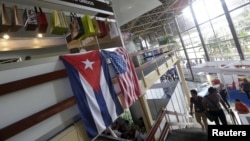The head of the U.S. Embassy in Cuba said Tuesday that the United States was on track toward normalization with Cuba, citing progress made in civil aviation, direct postal service and regulatory changes, while recognizing challenges regarding differences in human rights and property claims.
Jeffrey DeLaurentis said U.S. goals include the promotion of authorized travel and commerce, as well as the flow of information to the Cuban people.
“We have seen an increase in authorized travel by U.S. citizens by over 50 percent," he said. "A regulatory change helps promote a Cuban private sector that now accounts for at least one in four Cuban workers.”
A senior U.S. official who did not want to be identified told VOA the U.S. hopes by the end of the year to complete aviation talks to restore regularly scheduled commercial flights between the U.S. and Cuba.
While emphasizing safety of migration is a priority, the senior U.S. official said there was “no plan to alter current migration policy,” referring to thousands of Cubans stranded in Central America on their journey to the U.S. border.
The official added that U.S. concerns about Cuba’s human rights record remained a “a top priority” in negotiations toward normalization.
Cuba was listed by the Committee to Protect Journalists as the 10th most censored country, using imprisonment, Internet restrictions and other tactics to censor the press in 2015.
“Civil society recorded the highest number of arbitrary, short-term detentions over the last five years at nearly 9,000,” the State Department said in its annual human rights report issued in June, while noting Havana’s release of 53 political prisoners in the context of resumption of diplomatic relations.
December 17 will mark the one-year anniversary of President Barack Obama's announcement of the resumption of diplomatic relations between the two countries.




